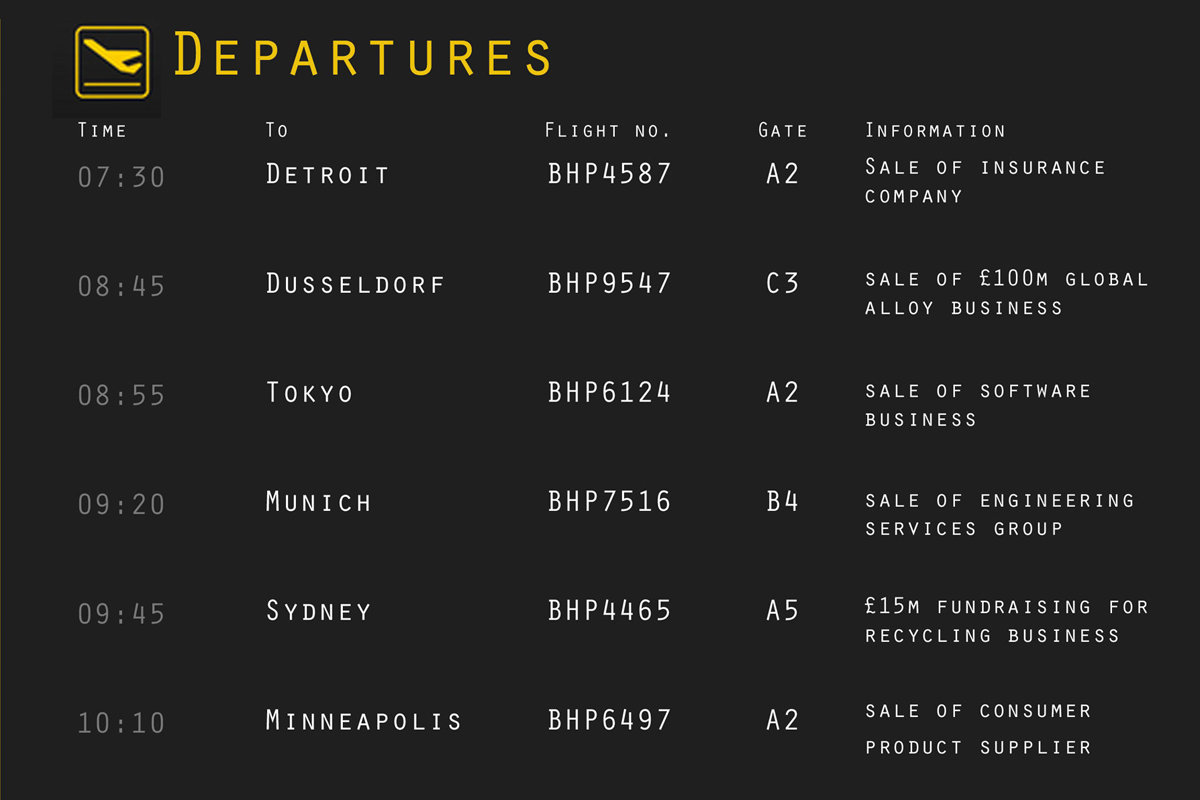
News Not quite the Maldives but the sun is shining for acquisitions in the UK

Britain may not have the beautiful atolls, coral reefs and azure lagoons of the islands of the Maldives, but it is certainly an island with many attractions…particularly for overseas corporates looking to grow by acquisition.
A year ago I wrote an article about the rise of cross border deals. As predicted, this trend has continued, with businesses from around the globe targeting Britain for M&A. During 2014 we have advised on and completed a significant number of corporate disposals, the majority of which were acquired by overseas buyers. This is illustrated by the ‘departure board’ [opposite], which shows destinations across Europe, North America and Asia. Indeed it would be very rare for a shortlist of potential buyers in any disposal process not to include at least one overseas business.
So, what is it that’s attracting foreign investors to the UK and what should UK companies looking to sell to international buyers be aware of?
Why the attraction?
There are many factors which draw international acquirors to the UK, not least of which is the number of high quality niche businesses based in the UK. The UK is seen as an open, ‘business friendly’ country in the eyes of international buyers. Its favourable labour laws, low tax regime and stable regulatory framework are all positive influences. The maturity of the UK market means that deal execution risk is lower than in many other countries, particularly the emerging markets.
Economic factors are currently helping to attract businesses from around the globe. The UK is growing again and consumer spending has increased. This is an attractive quality, particularly for US retailers and for countries such as China where growth has slowed significantly and Japan where the domestic economy is currently stagnant at best.
The UK also has additional draws for US companies. Our shared language and similar legal structures makes Britain a good base for them to set up operations, offering them a ‘beachhead’ into Europe, and increasing their potential for growth. US companies following a tax inversion strategy may also consider the UK for its lower corporation tax rates. All of these things need to be considered in any sale process.
Selling to international acquirors
Selling a business is likely to be one of the biggest events in anyone’s career. Clearly it is therefore crucial to get it right, particularly as the potential buyer population for any business should almost certainly include an overseas element.
Know where to look
Talk to people who have the resource and experience to identify and transact with international buyers. BHP Corporate Finance can identify overseas buyers that are the right fit for you. We can work through every step of the transaction with you, and through our membership of Kreston International (where we have representation in over 100 countries) we can make sure you get the high quality advice you need from advisors both here and abroad.
Be prepared
Usually you should begin preparing for a sale at least 12 to 18 months before beginning the transaction…the earlier the better. Typical features you would be looking for include a strong management team, reliable management information systems and robust employment contracts, as well as full evidence of any IP you own.
Don’t forget the day job
Your focus should always be on the success of your business. It is essential that your business continues to perform well throughout the disposal process, so trust your advisors to act on your behalf to prevent distraction.
Be flexible
It is important to recognise and allow for cultural differences. You and your advisors must understand the acquiror’s culture and way of doing business. This will help to build rapport with them and ensure a smooth transaction.
In conclusion, British companies are hot property right now. If you’re looking to sell, make sure you get organised and talk to someone who can help you to draw up a strategy for the process and then find the right buyer for your business.
More news & views

